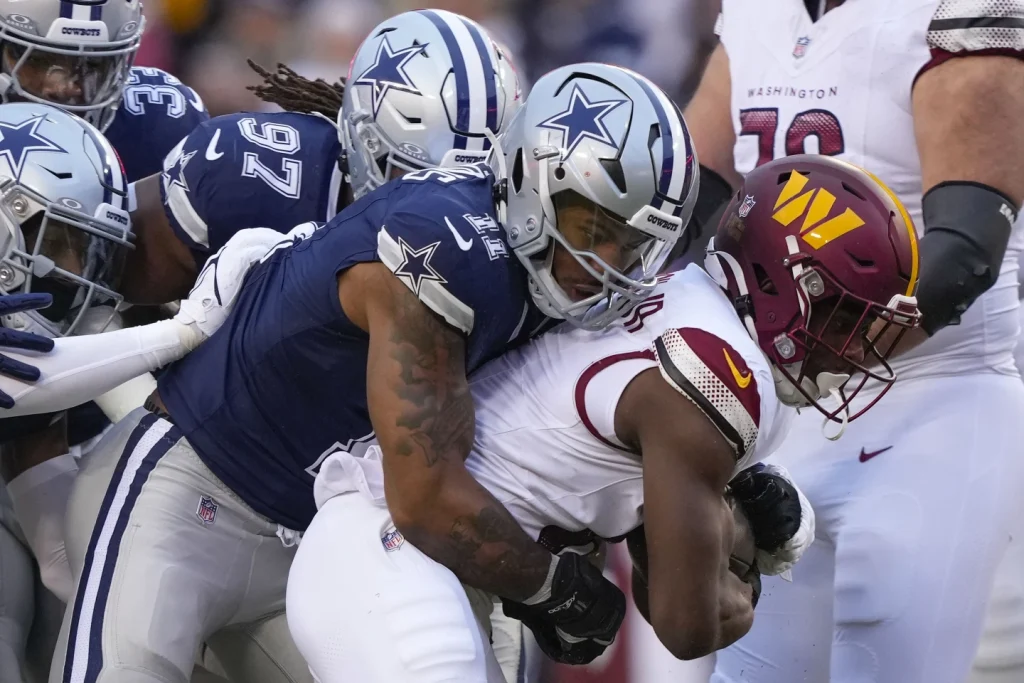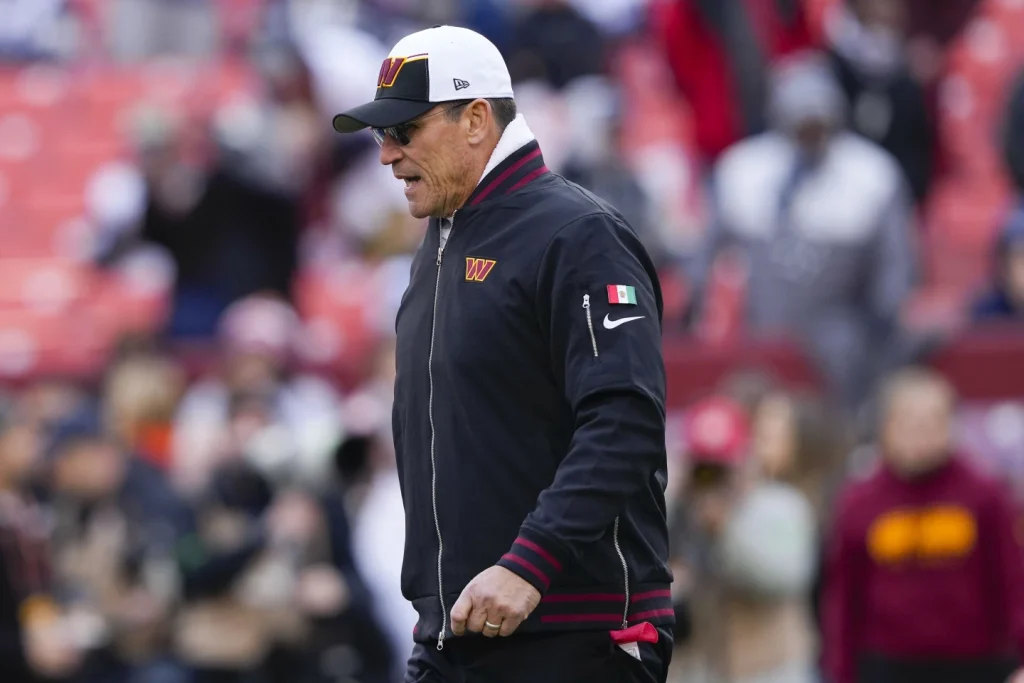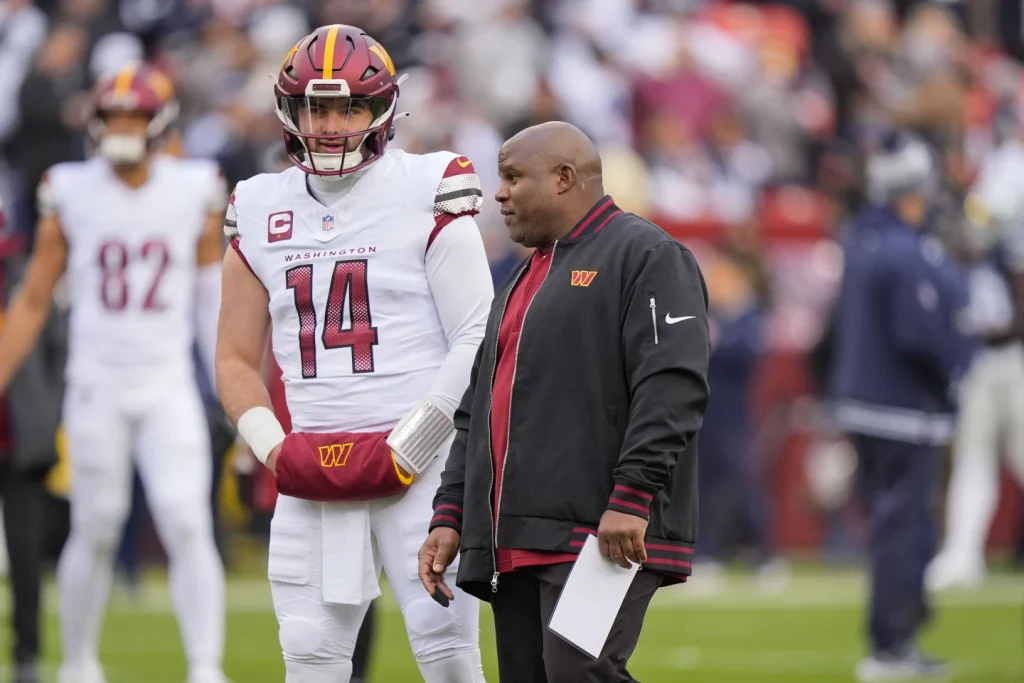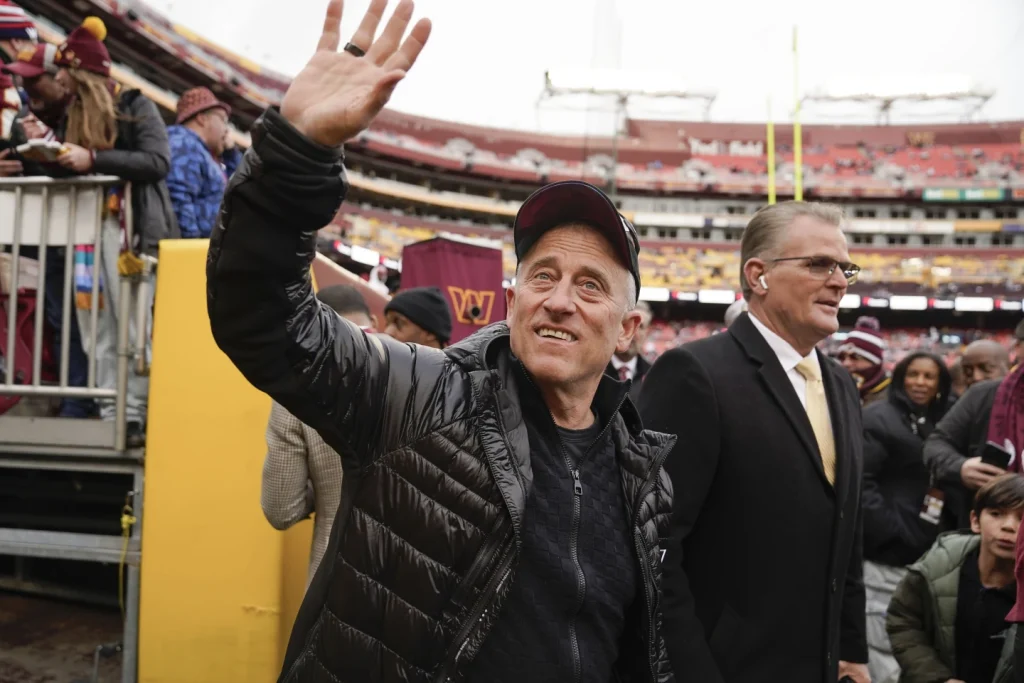The Washington Commanders’ recent 38-10 loss to the Dallas Cowboys marked the end of a disappointing season, prompting widespread reflection on the factors that led to their underwhelming performance.
Despite the somber mood, there remains a glimmer of optimism following the team’s descent to a 4-13 record, as this secured the No. 2 overall pick in the upcoming NFL draft.
This pivotal selection presents an opportunity for the anticipated new leadership to choose from the top two quarterback prospects: USC’s Caleb Williams and North Carolina’s Drake Maye.
The significance of this draft pick is underscored by the impact it could have on the team’s future trajectory.
Drawing parallels to the Houston Texans’ decision to select C.J. Stroud with the same pick last year, Washington defensive tackle Daron Payne envisions a transformative turnaround.
Payne’s reference to the Texans’ remarkable journey from a 3-13-1 record in 2022 to clinching a playoff berth serves as a compelling testament to the potential for rapid improvement in the NFL.
The underlying message is clear: the acquisition of a few key pieces, coupled with the addition of talented players, has the potential to ignite a team’s resurgence.
Payne’s assertion underscores the belief that a strategic infusion of talent can catalyze a team’s upward trajectory, transforming a struggling franchise into a formidable contender.
This sentiment resonates with the broader narrative of resilience and the capacity for teams to engineer remarkable turnarounds in the competitive landscape of professional football.
The significance of the upcoming draft and the potential impact of selecting a top-tier quarterback cannot be overstated.
The decision holds the power to shape the team’s trajectory for years to come, influencing not only on-field performance but also the morale and aspirations of players, coaches, and fans alike.
As the Commanders stand at a pivotal juncture, the weight of this decision is palpable, as it carries the promise of revitalizing the team’s prospects and ushering in a new era of competitiveness.
In the context of the broader NFL landscape, the Commanders’ situation serves as a microcosm of the league’s capacity for transformation and resurgence.
The ebb and flow of fortunes in professional football, characterized by the remarkable turnarounds and Cinderella stories, underscores the enduring optimism that defines the sport.
The Commanders’ pursuit of a potential franchise-altering quarterback mirrors the perennial quest for renewal and reinvention that animates the NFL, where hope springs eternal and the promise of a brighter future is ever-present.

As the Commanders embark on this pivotal juncture, the significance of their upcoming decision reverberates beyond the confines of the team itself.
It encapsulates the enduring allure of the NFL, where the promise of redemption and resurgence is woven into the fabric of the sport.
The impending selection of a quarterback represents not only a strategic move but also a symbolic gesture, signaling the team’s commitment to forging a new path and aspiring to greater heights.
In conclusion, the Washington Commanders’ upcoming selection in the NFL draft holds profound implications for the team’s future.
The prospect of choosing a top quarterback prospect represents a pivotal moment, carrying the potential to catalyze a transformative resurgence.
As the team confronts the aftermath of a challenging season, the promise of a brighter future beckons, underpinned by the enduring optimism and resilience that define the NFL.
The Commanders’ journey is emblematic of the league’s capacity for renewal and reinvention, encapsulating the timeless allure of professional football and the enduring pursuit of excellence.
The recent struggles of the Washington Commanders have been the subject of much scrutiny and speculation in the world of professional football.
The team’s disappointing performance in their final eight games, including the firing of defensive coordinator Jack Del Rio and the subsequent takeover of play-calling on defense by coach Ron Rivera, has left many fans and analysts questioning the future of the franchise.
The Commanders’ six consecutive losses to end the season have tied a franchise record for the most defeats in a single season, highlighting the team’s struggles on the field.
As a result, there has been widespread speculation about the future of the coaching staff and front office, with many expecting significant changes to be made in the coming weeks.
One of the most significant developments in this regard has been the impending meeting between coach Ron Rivera and controlling owner Josh Harris.
The outcome of this meeting is expected to have far-reaching implications for the future direction of the franchise, as it is widely anticipated that there will be significant changes to the front office and coaching staff.
In light of these developments, coach Rivera has been candid about the uncertainty surrounding his own future with the team.

He has acknowledged that there is only so much that he can control in this situation and has expressed a willingness to engage in discussions with ownership about the way forward.
Rivera’s willingness to engage in open and honest dialogue with ownership reflects his commitment to finding a resolution that is in the best interests of the team and its fans.
One of the most significant potential changes that has been discussed is the division of responsibilities between the personnel and head coaching roles.
It has been reported that controlling owner Josh Harris plans to split these roles moving forward, signaling a significant shift in the organizational structure of the franchise.
As the Commanders navigate this period of uncertainty and transition, it is clear that there are significant challenges ahead.
The team will need to make important decisions about the future leadership of the organization, as well as the direction of the coaching staff and player personnel.
These decisions will have a significant impact on the team’s ability to compete at a high level in the future, and it is crucial that they are made thoughtfully and with a long-term perspective in mind.
In conclusion, the recent developments surrounding the Washington Commanders have generated significant interest and speculation within the football community.
The impending meeting between coach Ron Rivera and controlling owner Josh Harris is expected to be a pivotal moment in determining the future direction of the franchise.
As the team prepares to make significant changes to the coaching staff and front office, it is clear that there are significant challenges ahead.
However, with a thoughtful and strategic approach, the Commanders have the potential to emerge from this period of transition as a stronger and more competitive team in the years to come.
The Washington Commanders, formerly known as the Washington Football Team, have recently experienced a significant transition in their coaching staff and player dynamics.
The departure of head coach Ron Rivera, after a tenure that resulted in minimal success, has left the franchise at a crossroads.
Furthermore, the struggles of quarterback Sam Howell and the uncertainties surrounding offensive coordinator Eric Bieniemy have added to the team’s challenges.
This essay will delve into the implications of these developments and explore the potential paths forward for the Washington Commanders.
Rivera’s tenure with the Commanders was marked by a solitary playoff appearance, which culminated in a defeat.
This lack of substantial achievement during his leadership has left the team with few foundational elements for future success.

The 2023 season was anticipated as an opportunity for Sam Howell to showcase his potential as the franchise’s quarterback.
Despite this, Howell’s performance did not meet expectations, as evidenced by his league-high 21 interceptions and 65 sacks over 17 games.
These statistics highlight the struggles faced by the young quarterback, raising questions about his ability to lead the team effectively.
The arrival of Eric Bieniemy as the offensive coordinator was intended to provide a fresh perspective and potentially propel him into consideration for an NFL head coaching position.
However, the collaboration between Bieniemy and the team encountered challenges, as indicated by veteran tight end Logan Thomas, who described their experience as having “ups and downs.”
This friction underscores the complexities of integrating new coaching strategies and adapting to different leadership styles within a team environment.
The uncertainties surrounding Bieniemy’s future with the Commanders further contribute to the team’s instability.
In the aftermath of Rivera’s departure, the Commanders find themselves at a critical juncture, seeking to redefine their identity and chart a new course for success.
With a record of 26-40-1 during Rivera’s tenure, the team faces the task of selecting a new head coach who can instill a winning culture and guide the players towards sustained excellence.
Rivera’s coaching career, which commenced with an extensive tenure in Carolina, has now reached a pivotal juncture, prompting reflection on the legacy he leaves behind.
As the Commanders navigate this period of transition, the organization must carefully consider its future direction.
The decision-making process regarding the selection of a new head coach and potential quarterback acquisitions will significantly impact the team’s trajectory.
Rivera’s deferential stance on the matter of drafting a quarterback with the second pick underscores the need for a comprehensive evaluation of the team’s needs and priorities.
The organization’s commitment to making decisions that align with its long-term vision will be crucial in shaping the Commanders’ future prospects.
In conclusion, the Washington Commanders find themselves in a period of transition and introspection following the departure of Ron Rivera and the challenges faced by key players.
The team’s ability to navigate these complexities and make strategic decisions will be pivotal in determining its trajectory in the NFL.

As the Commanders seek to redefine their identity and pursue sustained success, the lessons learned from the recent experiences will serve as valuable insights for the future.
It is imperative for the organization to approach this juncture with a clear vision, strategic planning, and a steadfast commitment to building a competitive and resilient team.
In light of these developments, the Washington Commanders stand at a pivotal crossroads, poised to embark on a new chapter in their journey towards NFL prominence.
